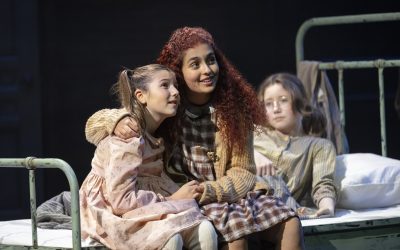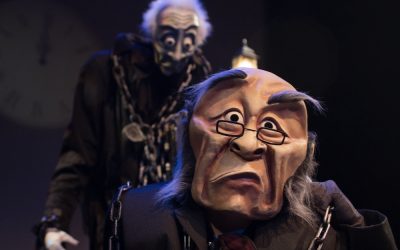For at least the first two-thirds of Medicine, I was bored. It was never the actors’ fault, it was the script’s. When hope made an appearance in the story, I started getting into it.
Irish playwright Enda Walsh’s 2021 work is set in an activity room in a psychiatric institution. John Kane is a long-term resident. And this is the day that comes once a year, in which two professional performers arrive to enact John’s life story with him. The intention, presumably, is therapeutic. If this set-up sounds more or less naturalistic, consider this: both the hired actors are named Mary, the first arrives dressed in character as a man (complete with full beard and bushy eyebrows), and the second shows up in a lobster costume. In the middle of the activity room, there’s a booth that contains wigs and costumes, and is the source of a wind so fierce it regularly sends Lobster Mary tumbling out its door. When that happens, she has to struggle to get back in, clawing her way across the floor, getting knocked back, inching forward, buffeted by the gale.
If you think this sounds interesting, consider this: In Medicine’s mixture of naturalism and absurdism, the two most available themes are criticism of the mental health system and a parody of actorly narcissism. Neither theme is explored with much depth. Lobster Mary relentlessly asserts her dominance over Man Mary. Lobster Mary, who is called Mary #2 in the script, insists that she is the star of this operation and Man Mary (Mary #1) a mere bit player and technical assistant. Lobster Mary also demands lavish praise: when Man Mary says that her acting in a short sequence has been “good”, Lobster Mary tells her that calling an actor’s work good is like shitting in their mouth. Medicine’s criticism intolerance of emotional differences, in the mental health system and elsewhere, isn’t much more subtle. In his autobiography, John tells us about his abusive parents, the ridicule he suffered from other kids, and his incarceration in this “hospital”, where he is threatened and beaten by staff. I’m aware of the abuses that can take place in psychiatric institutions, particularly mistreatment of the most vulnerable. But, in my experience, John’s suffering, as written by Walsh, is so generic that it bears little weight. And the whole business about actors being narcissistic is an unfair cliché.
John is not likely to receive meaningful assistance from the two Marys, who are squeezing this gig in between other engagements (hence the costumes they’re wearing when they enter). And John is passive, so he’s not likely to help himself. Because we’re stuck in a set-up that offers little hope of change or development, things quickly get dull.
But there’s a shift. As we review John’s story, we hit a point where he forms a friendship with a patient named Valerie. Hope. And, in the overlapping realities of John’s background and his relationships with the two Marys, Man Mary, who sometimes plays the role of Valerie, emerges as a genuinely compassionate figure. Hope in the present tense. That’s why I found the play’s final third so much more engaging.
And the booth is intriguing. If I were to hazard a guess, I’d say the chaos emerging from the booth, might be about the force of real life’s challenges to the dominant culture’s control over personal and social narratives.
As I said, under Richard Wolfe’s direction, the performances from the three actors in this Pi Theatre production are admirable. There’s a vampiric glee in the way Genevieve Fleming’s Lobster Mary relishes John’s reenactment of his traumas. And, in her physical performance, Fleming does an amazing job of miming the fight-the-wind sequences. Playing the second-fiddle Man Mary, the one who starts to question the wisdom of their “therapeutic” exercise, Nyiri Karakas mines her character’s low-status comedy and provides much-needed emotional groundedness. Jay Clift’s John is the centrepiece: always honest, responsive, vulnerable, mercurial.
There’s a fourth onstage presence: drummer Stephen Lyons, who supports and expands upon the rhythms of Welsh’s poetic text. Lyons’s work is flawless, complex and seamlessly integrated.
The so-real-you-can-smell-it set is by David Roberts.
Perhaps as part of his exploration of dissociation and the difficulty of maintaining personal coherence in a hostile environment, Walsh has scored the script so that it contains several combinations of live and recorded voices. Texturally, that’s pretty great and, thanks largely to sound designer Alex Mah, it resonates here.
The rich lighting design — fluorescent, crackling, melancholy, dramatic —is by Victoria Bell.
As I see it, Pi Theatre’s offering is a strong production of a frustrating script.
MEDICINE by Enda Walsh. Directed Richard Wolfe. On Friday, June 14. A Pi Theatre production running in Vancity Culture Lab at The Cultch until June 23. Tickets and info
PHOTO CREDIT: (Photo of Jay Clift by Sarah Race Photography)






0 Comments